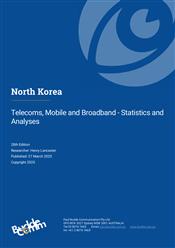North Korea Telecoms Market Report
Telecoms, Mobile and Broadband - Statistics and Analyses

North Korea’s telecom sector shrinks even more following Orascom write-down
Following years of isolationism and economic under-achievement, North Korea languishes near the bottom of the world’s telecom maturity index alongside Afghanistan and Turkmenistan (who also happen to be struggling under repressive political regimes). To make matters worse, in 2022 North Korea achieved the lowest score in the world for economic freedom. It barely needs saying that developing a healthy and prosperous telecommunications sector isn’t exactly high on the dictatorship’s agenda.
The obstacles to building a functioning telecom network are so numerous that a fixed-line segment barely exists. Foreign investors have been permitted to partner with the North Korea Post & Telecommunications Corporation (NKPTC) to progress mobile voice, text, and broadband services, albeit on a strictly limited scale and with tight restrictions over what can be accessed. Mobile penetration is estimated to have eased up slightly to reach 19% in 2021, yet the high cost of ownership coupled with strict censorship makes mobile communications the exclusive domain of senior government officials and diplomats.
For those citizens living close to China, it has been possible to obtain Chinese handsets and SIM cards, and to connect to towers (illegally) located just across the border. While this offers access to the outside world and at much lower prices than the state-controlled offerings, the risks are high including steep fines and the possibility of jail time.
North Korea has been slightly more effective in building an IT sector and a nascent digital economy on the back of a concerted effort to grow a sizeable, well-trained IT workforce. But even here, its capabilities have been directed more towards nefarious activities such as cybercrime and hacking into Western countries’ computer systems. North Korea’s determination to put itself offside with the rest of the world in pursuit of its ideology can only lead to tighter controls on communications inside and outside of the country.
This report update includes the latest Telecom Maturity Index charts and analyses; an assessment of the global impact of the pandemic on the telecoms sector; and recent market developments.
Key developments:
- Orascom writes off its investment in mobile market leader Koryolink, effectively handing over the network to government control.
Companies mentioned in this report:
North Korea Post and Telecommunications Corp (NKPTC), NEAT&T, Sunnet, Lancelot Holdings, Loxley Pacific, Orascom, Koryolink, Kang Song, Byol.
Related Reports
- 2019 Asia - Mobile Network Operators and MVNOs
- 2019 Asia - Fixed Broadband Market - Statistics and Analyses
- 2019 Asia - Mobile Infrastructure and Mobile Broadband
- Thailand - Telecoms, Mobile and Broadband - Statistics and Analyses
- Afghanistan - Telecoms, Mobile and Broadband - Statistics and Analyses
- Macau - Telecoms, Mobile and Broadband - Statistics and Analyses
- Kyrgyzstan - Telecoms, Mobile and Broadband - Statistics and Analyses
- Laos - Telecoms, Mobile and Broadband - Statistics and Analyses
- Bhutan - Telecoms, Mobile and Broadband - Statistics and Analyses
- Turkmenistan - Telecoms, Mobile and Broadband - Statistics and Analyses
Share this Report
TMT Intelligence
A platform to scale your intelligence tasks
Monitor critical insights with our AI-powered Market Intelligence Platform gathering and analyzing intelligence in real time. With AI trained to spot emerging trends and detect new strategic opportunities, our clients use TMT Intelligence to accelerate their growth.
If you want to know more about it, please see:
Research Methodology
BuddeComm's strategic business reports contain a combination of both primary and secondary research statistics, analyses written by our senior analysts supported by a network of experts, industry contacts and researchers from around the world as well as our own scenario forecasts.
For more details, please see:
More than 4,000 customers from 140 countries utilise BuddeComm Research
Are you interested in BuddeComm's Custom Research Service?
Hot Topics
News & Views
Have the latest telecommunications industry news delivered to your inbox by subscribing to BuddeComm's weekly newsletter.